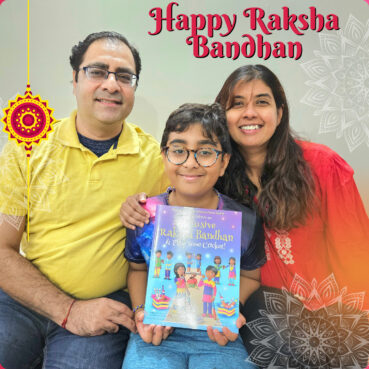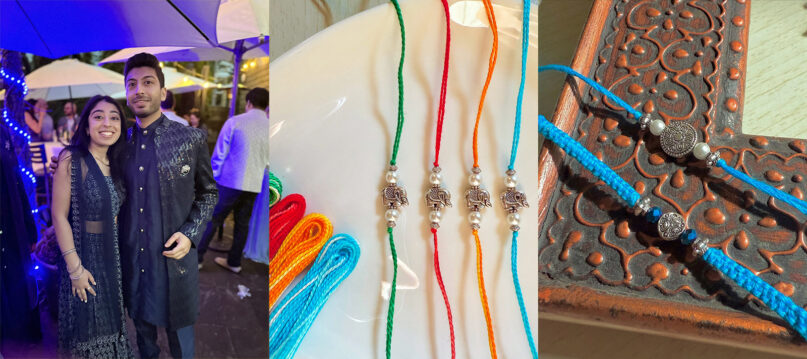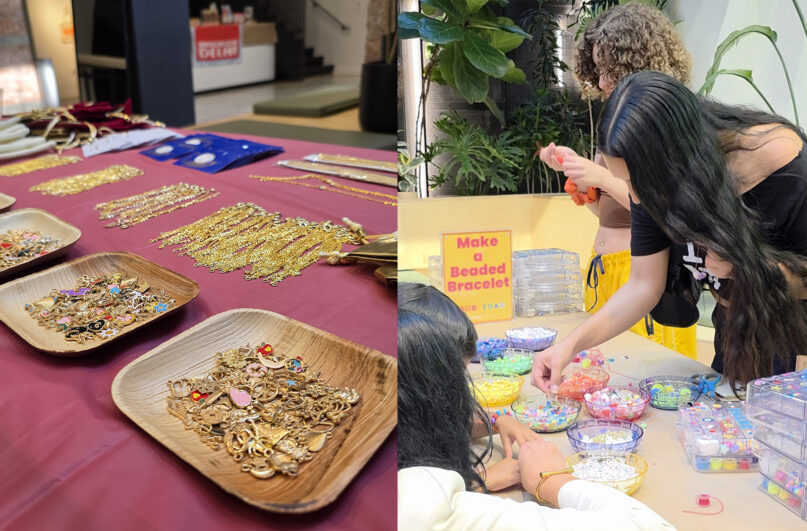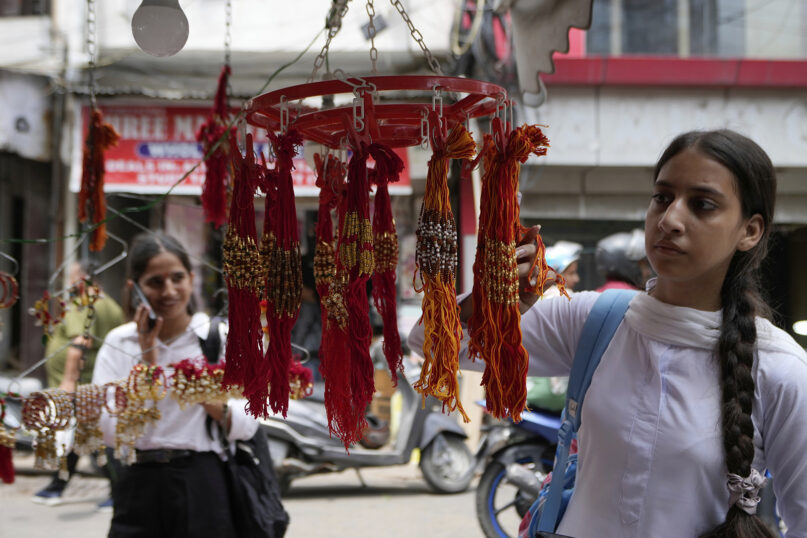(RNS) — The Hindu holiday of Raksha Bandhan, which falls on Saturday (Aug. 9), has long followed a familiar custom: a sister ties a rakhi, or sacred thread, around her brother’s wrist to symbolize her love and prayers for his well-being. In return, the brother gives her a gift and promises to protect her.
That message didn’t always sit right with some Hindus.
“Over and over, the narrative that I heard growing up was quite clear: the woman is asking for her protection from the brother,” said Ajanta Chakraborty, a children’s book author and public speaker. “I always felt that it should be a two-way street. In a sibling relationship, and for that matter, any relationship, both parties should take care of each other.”
The holiday is now getting what practitioners like Chakraborty say is a much-needed revamp. No longer does the celebration have to be gendered, say these American Hindus. Instead, Raksha Bandhan, which directly translates to “bond of protection,” should celebrate mutual care, affection and equality in all familial relationships.
“Every family is figuring this out in their own way,” she told RNS. “No matter what your family looks like, there is still a way to be part of this beautiful festival.”

Author Ajanta Chakraborty, right, and her family holding “Let’s Celebrate Inclusive Raksha Bandhan.” (Photo courtesy Chakraborty)
In her Chicago neighborhood, Chakraborty said it is now increasingly common to see sisters tying rakhis on sisters, friends spending the holiday with each other or kids without siblings giving the sacred thread to their “closest companion”— like the family dog. The founder of educational organization Bollywood & Culture Groove, who goes by Ms. Ajanta on social media, she released the children’s book “Let’s Celebrate an Inclusive Raksha Bandhan” last year with her husband, Vivek Kumar. It’s the latest in a 16-book series following siblings Maya and Neel as they learn about diverse Indian celebrations.
To Chakraborty’s surprise, many Hindu parents said the book, which includes a scene in which Maya protects Neel in a sticky situation, represented what they had already been doing, validating their choices to stray from tradition. While some parents who came to the United States from India earlier may have held onto rigidity within Hindu rituals, she said, the next generation of parents and children are looking forward.
“Hinduism, I think, has always been so open minded,” she said. “It’s only our own sort of prejudices that kind of bring that focus down.”
For 18-year-old Ria Budhrani, a second-generation Indian American from Long Island, New York, celebrating Raksha Bandhan with her older brother was more or less traditional growing up, until the siblings switched it up around six years ago.
“I think the first year he had question marks in his eyes,” Budhrani said, “like ‘Why am I tying a rakhi? That’s supposed to be the other way.’”
But Budhrani and her extended family felt inspired to change with the times. “Hindu traditions are deep rooted,” she told RNS. “We all know that these traditions have been around for a really, really long time, and when people learn these traditions, they learn it in one way: the stereotype that a man can protect a girl, but a girl can’t really do anything for a man.
“Once you stray from that stereotype, I think you can open your mind to a lot more variations in how you can celebrate Raksha Bandhan,” she said.

Siblings Ria, left, and Krish Budhrani, and a variety of ColorrWay rakhis created by Ria Budhrani. (Photos courtesy Ria Budhrani)
During the COVID-19 pandemic, Budhrani, an avid crafter, had the idea to start an Etsy shop, called ColorrWay, to sell fashionable rakhis to Hindus across the country.
“I realized that every time I tied a rakhi to my brother, he would literally take it off the same day,” she said, pointing to the lack of style seen in more traditional variations. Now, Budhrani sells around 500 rakhis of different colors and original designs each year, some with more “feminine” elements for the girls celebrating the holiday.
“There’s a lot that a rakhi holds for a person, and when people order from me, it’s like they put all their trust in me to transfer their wishes and their blessings and their love with the rakhis to their siblings,” she said.
Millennial Avani Sarkar, a New Jersey resident, is the youngest of three siblings, and the only girl. Having moved to the U.S. from India at age 8, Sarkar was raised with fixed gender roles. She was the only sibling to learn how to make rotis, or Indian bread, she noted. Sarkar grew up tying rakhis on her older brothers’ wrists, and still does, honoring her parents’ 40-year-old tradition and family dynamic.
But for her own children, two girls and a boy between the ages of 4 and 8, Raksha Bandhan goes beyond what the older generations taught.

People make bracelets during the Build-a-Bond Raksha Bandhan event hosted by Modi Toys in New York, Aug. 7, 2025. (Photo courtesy of Avani Sarkar)
“A rakhi is a reminder that ‘Hey, you guys are born in the same family just by God’s blessing,’” she said, “‘but what’s more important is the bond you have.’ I have them make a promise, that you guys love each other and you will always protect each other.”
A sibling relationship is the longest relationship one may have in their life, Sarkar added. Along with her older brother, she now runs a business called Modi Toys, which sells Hindu mythology-inspired stuffed toys and children’s books. The company hosted a Raksha Bandhan event in New York titled Build-a-Bond, where children and their parents created their own beaded bracelets in a reimagined celebration of the holiday. And tomorrow, her kids will make the same bracelets for each other and eat candy rather than Indian sweets — another way the Sarkar family will break out of prescribed molds.
“One of the things that’s really important to me as a mom, as a parent, is to ensure that the sanctity of their bond, it stays there forever,” Sarkar said. “I want to really build the foundation to be so strong that no matter how old they are, down the line, even when I’m long gone, I want them to be able to turn to each other.
“It’s not like because you’re the older one, you have to look out for your younger siblings, or just because you’re the boy, you have to look out for the girl,” she said. “Every family has their own dynamic and their preferences, but to me, this is what I feel is right and fair.”

Indian girls shop for ‘rakhi,’ the sacred thread symbolizing sibling bonds, ahead of the Raksha Bandhan festival in Jammu, India, Monday, Aug 4, 2025. (AP Photo/Channi Anand)
